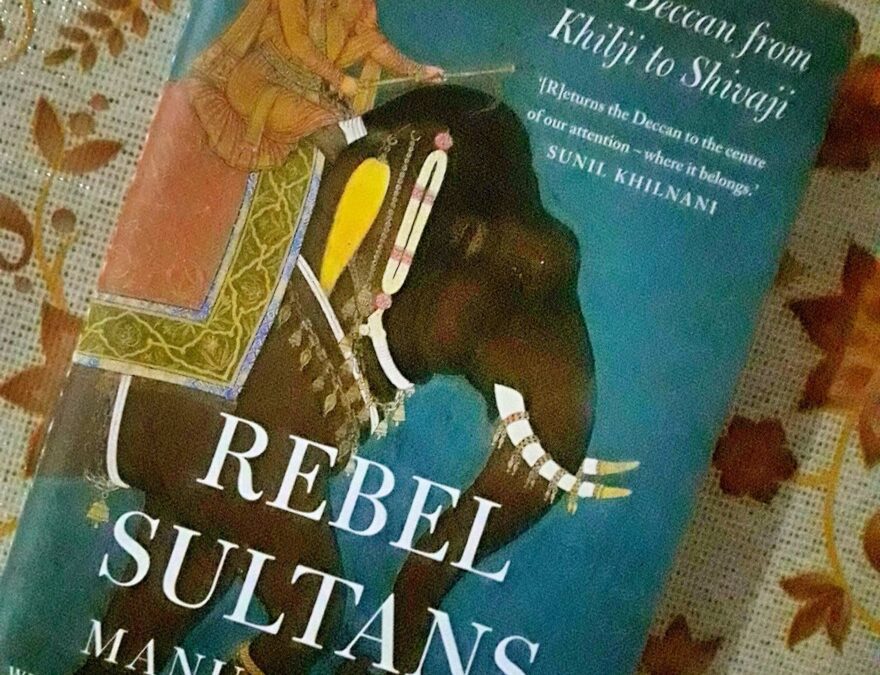Rebel Sultans: The Deccan from Khilji to Shivaji — by Manu S. Pillai
Publisher: Juggernaut books
Pages:336
Price: Rs. 599 INR(Hardcover)
ISBN: 9789386228734
Buy here: https://amzn.to/2Mso7a7
In 1707 when Emperor Aurangzeb went to his grave, the Mughal empire began to crack into a hundred fractured pieces. It was the lure of the Deccan that drained this conqueror’s energies, putting him on a course of collision with his most threatening adversaries. After all, the Deccan was a land that inspired wonder. Its treasures were legendary, and its kings magnificent. It was a horizon of rousing adventure, attracting talent from beyond oceans. A traveller here could encounter bands of European snipers, available for military hire, or forbidding fortresses where African nobles scaled the heights of power. Diamonds and pearls lay heaped in the Deccan’s bazaars, while in its courts thrived Persians and Marathas, Portuguese and Georgians, presiding over a world of drama and betrayal. A thousand fortunes were made in the Deccan, drawing the formidable envy of generations of Mughal emperors.
In Rebel Sultans, Manu S. Pillai narrates the story of the Deccan from the close of the thirteenth century to the dawn of the eighteenth. Packed with riveting tales and compelling characters, this book takes us from the age of Alauddin Khilji to the ascent of Shivaji. We witness the dramatic rise and fall of the Vijayanagar empire, even as we negotiate intrigues at the courts of the Bahmani kings and the Rebel Sultans who overthrew them. From Chand Bibi, a valorous queen stabbed to death, and Ibrahim II of Bijapur, a Muslim prince who venerated Hindu gods, to Malik Ambar, the Ethiopian warlord, and Krishnadeva Raya on Vijayanagar’s Diamond Throne — they all appear in these pages as we journey through one of the most arresting sweeps of Indian history. Unravelling a forgotten chapter in our medieval past, Rebel Sultans reminds us of a different age and a different time in the Deccan — one that ended an empire and rewrote India’s destiny.
About the author
Manu S. Pillai is a writer based in London. His book the Ivory Throne won the Sahitya Akademi Yuva Puraskar in 2017. Formerly chief of staff to MP Shashi Tharoor, he is also a columnist at Mint Lounge. His writing has appeared in the Hindu, Hindustan Times, Open magazine and other publications. Rebel Sultans is Manu’s second book.
My take on the book
The book traces the story of the Deccan from end of thirteenth century till early eighteenth century which includes the Rayas of Vijayanagar, the Bahmani Sultans, the Adil Shahs, the Nizam Shahs, the Imad Shahs, the Qutub Shahs and the warlord Malik Amber. Ofcourse, any account of history around this time, is incomplete without the touching the lives of Mughals. The book narrates the story of all these kings who ruled the Deccan during these 4–5 centuries.
Rebel Sultans narrates the stories of the blood thirsty and war hungry kings who made Deccan their homeland, but its not just about the multiple wars they wage or the fallen kingdoms. It is also about who succeeds whom in such dramatic scenarios, how blinding the probable successor is common practice, brothers kill each other for the throne, allies turning foes. Most of the historic happenings are documented by foreign travelers, or by paintings from the kings’ palaces. How the Sultans created their own capitals in Bijapur, Ahmadnagar, Hyderabad. How flourishing kingdoms are looted and destroyed and deserted, how Persian and Iranian influences seep into the Deccan culture. How woman showed equal valor and bravery when the situation arises. And at the end, how Moghal emperors had the upper hand on the entire Deccan. The book touches these and more.
Author Manu has done extensive research about the Deccan sultans to present an exclusive account of them which is generally not the subject for many history books. The illustrations, the family trees add to the narration. The unknown details like how some of these Sultans painted their nails, chilling details of how men are killed and cooked, make the reading quite interesting. The narration is smooth while including the lives and times of Kings across the Deccan and over the years. While history books generally come across as series of events documented chronologically, this books stands out because a story is woven around these events without making it boring.
Pick this one to re-live the bygone times of the Deccan, the forts, the thrones, the slaves, the treasures, the art and ofcourse the Sultans.
My rating
5/5.
